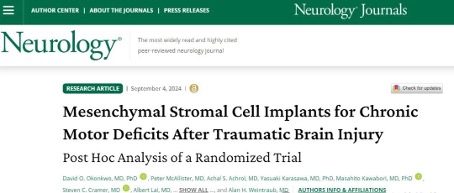Implantation of mesenchymal stem cells significantly improves motor function in patients with brain injury
September 28, 2024
Source: drugdu
 268
268
Traumatic brain injury (TBI) is a heterogeneous disease characterized by brain damage and functional impairment caused by external forces. Under the influence of multiple mechanisms, the disability and mortality rates of TBI patients are relatively high, which imposes a heavy burden on families and society. The clinical treatment of TBI mainly involves surgical intervention and symptomatic treatment to alleviate cerebral hypoxia, cerebral edema, and metabolic disorders. In recent years, stem cells have gradually become one of the research hotspots for TBI treatment. A research team from the United States and Japan published a clinical observation report titled Mesenchymal Stromal Cell Implants for Chronic Motor Defects After Traumatic Brain Injury in the Neurology journal on September 4, 2024. The researchers found that implanting mesenchymal stem cell (SB623) cells can help TBI patients restore motor function and daily life skills.
A research team from the United States and Japan published a clinical observation report titled Mesenchymal Stromal Cell Implants for Chronic Motor Defects After Traumatic Brain Injury in the Neurology journal on September 4, 2024. The researchers found that implanting mesenchymal stem cell (SB623) cells can help TBI patients restore motor function and daily life skills. Traumatic brain injury (TBI) is the leading cause of death and disability in trauma related injuries worldwide. The global incidence rate of TBI with various causes and severity is estimated to be 69 million cases per year. The progress of acute clinical nursing has improved the survival rate after TBI, but there is currently no approved treatment for TBI, and many patients have lifelong disabilities.
Traumatic brain injury (TBI) is the leading cause of death and disability in trauma related injuries worldwide. The global incidence rate of TBI with various causes and severity is estimated to be 69 million cases per year. The progress of acute clinical nursing has improved the survival rate after TBI, but there is currently no approved treatment for TBI, and many patients have lifelong disabilities.
The prevalence of TBI related long-term disabilities varies around the world. According to reports, in the United States, about 43% of hospitalized patients with TBI suffer from long-term movement disorders, while approximately 5.3 million people have TBI related disabilities. In addition, it has been reported that over one-third of severe TBI patients have at least one neuromotor disorder after 2 years of acute rehabilitation. Despite improvements in the treatment of acute TBI, long-term movement disorders secondary to TBI remain a major unmet medical need.
Multiple early clinical studies have confirmed that cell therapy may become a safe and effective treatment for restoring chronic TBI related injuries.
In this study, researchers conducted a retrospective analysis of a double-blind, randomized, surgical, and sham controlled Phase 2 STEMTRA trial (June 2016 to March 2019) and followed up for 48 weeks.
Participants with moderate to severe TBI, at least 12 months after injury, and chronic movement disorders were randomly assigned in a 1:1:1:1 ratio to undergo stereotactic surgery with mesenchymal stem cell implantation (2.5 × 10 ^ 6, 5.0 × 10 ^ 6, 10 × 10 ^ 6) or sham surgery. The primary efficacy endpoint showed that the Fugl Meyer Movement Scale (FMMS) score of the mesenchymal stem cell group changed significantly more at 24 weeks compared to the control group.
The results showed that 211 participants were screened, 148 participants were excluded, and 63 participants were randomly assigned, of which 61 completed the experiment. Individual participants in the mesenchymal stem cell 2.5 × 10 ^ 6 and 5.0 × 10 ^ 6 cell dose groups stopped taking medication before surgery.
An evaluation of the safety and efficacy of patients undergoing surgery showed that the mesenchymal stem cell group improved FMMS scores faster than the control group at 24 weeks and continued to improve at 48 weeks. At 48 weeks, the mesenchymal stem cell group showed more improvement in function and activities of daily living (ADL), with similar adverse events between the two groups and no deaths or withdrawals.
Researchers have found that implanting mesenchymal stem cells can help TBI patients restore motor function and daily life skills.
In summary, this report presents a post hoc analysis of the 1-year, double-blind, randomized, sham operated controlled Phase 2 STEMTRA trial (NCT02416492). Compared with the control group participants, participants receiving mesenchymal stem cell (SB623) treatment achieved higher scores and faster improvement rates on the primary efficacy endpoint of FMMS score at 24 weeks, and continued to improve at 48 weeks. Compared with the control group participants, participants receiving SB623 treatment showed a greater trend of improvement in function and ADL scores at 48 weeks. The implantation of SB623 cells is safe. Future clinical development should focus on 5 × 10 ^ 6 cell doses, as the changes in exercise scores relative to baseline at 24 and 48 weeks were significantly higher than those in the control group, especially since improvements in exercise status may be related to improvements in quality of life.
By editorRead more on
- 20-Valent Pneumococcal Vaccine Approved for Clinical Trials January 20, 2026
- ADC205 Tablets Received Approval for Drug Clinical Trial January 20, 2026
- Sifang Optoelectronics makes strategic investment in Changhe Biotechnology January 20, 2026
- Mingde Bio plans to acquire a 51% stake in Hunan Lanyi through capital increase and acquisition January 20, 2026
- accelerating the transition of CLL treatment into a “chemotherapy-free era”. January 20, 2026
your submission has already been received.
OK
Subscribe
Please enter a valid Email address!
Submit
The most relevant industry news & insight will be sent to you every two weeks.



